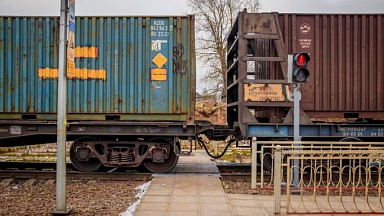Due to climate change, the water level of the Rhine (and other rivers) is so low, that ships can only carry a fragment of their usual load. Germany is especially affected by this, as transporting goods by inland waterways is more important here than in many other Western European countries.
Not historically low
However, the water level of the Rhine is not as low as in October 2018, when it reached the record low of 27 centimetres. The sense of urgency stems more from the fact that coal transports must continue to keep fueling the power grids of Europe, to avoid a potential energy crisis. These coal transports are mostly carried out by barge.
In Germany, these priorities have been set straight by the government. Coal transport must be shifted to the railways, at the expense of passenger and other freight transport, explained the transport minister. This prioritisation might be legalised if it is approved by the cabinet in the coming weeks. Poland is looking at similar measures.
Less of an option
But there is a lot more to be shipped than just coal. For those shippers, rail is much less of an option. Shippers cannot just shift to rail in low-water periods. They need to build rail terminals to do that. The railway network is also congested at the moment, and it is more expensive than shifting to ocean shipping, commented Albert Jan Swart, economist at ABN Amro.
Add to this the infrastructure bottlenecks on the railway network today, also in Germany. The German infrastructure manager is carrying out a massive upgrade of the network, which severely restricts the capacity. In August, these restrictions are at the highest level, with disruptions on the network being the norm, according to DB Cargo.
Not a new idea
The idea of shifting to rail in times of low water is not entirely new. In previous years, arrangements have been made, also by railway undertakings. For example Lineas, which provided fourteen weekly Xpress services and additional capacity to the Mannheim region in the summer of 2020 to facilitate the shift from barge to rail and ensure the continuity of supply chains.
A task force has been set up this year too, informs a spokesperson at the company. «We are currently looking at the possibility of providing additional capacity for those who want to shift to rail. But the capacity on the railway network is limited at the moment», the person explains.
Never a good idea
According to the German rail association NEE, rail has never been able to be an alternative to barge. «It is the fourth summer in a row with low water on the main routes of inland shipping in Germany and in three of them, the mineral oil industry and politicians were asking the question of whether the railroad can replace the usual large transport share of the inland vessels.
«And three times in a row, the answer was always the same: not in the short term, because no one would acquire the cost-intensive additional resources for a comparatively rare and in any case irregular situation without a sure promise that it would be used.»
Energy comes first
When it comes to the supply of energy, however, concessions are made. If the legal act in Germany passes, energy supplies will be prioritised over other cargo on rail, and this is likely to be seen in other countries too. This is supported by a lot of railway companies.
«Due to the low water levels, inland waterway vessels are able to transport fewer goods, and at the same time significantly more oil, gas and coal should actually arrive in order to avoid energy bottlenecks in the winter months. Therefore, prioritising rail freight is a logical and sensible decision. As a result, freight trains arrive faster, without long waiting times, and more supply-relevant trains can run overall», says Hector Rail, a Swedish-headquartered operator.
Once these energy supplies are on the rails, the network will indeed be little available for other cargo shippers, be it those already on rails or those that would like to be.



